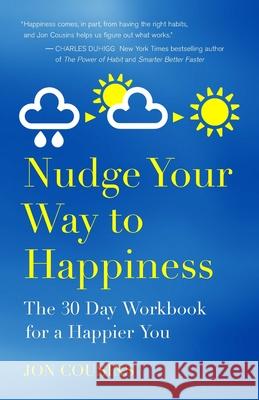Nudge Your Way to Happiness: The 30 Day Workbook for a Happier You » książka
Nudge Your Way to Happiness: The 30 Day Workbook for a Happier You
ISBN-13: 9781530042609 / Angielski / Miękka / 2016 / 294 str.
Jon Cousins learned the hard way that getting help for a mental health problem isn't easy. After failing to get proper support, he ended up using his creativity to devise a unique and innovative way of measuring and then improving his mood.
Now he's distilled that approach into this highly original 30 day workbook whose approach has been proved in a pilot test.
For each of its 30 days you'll be asked to rate your wellbeing with a short test, giving you a score you can plot on a graph at the back of the book.
Then, based on your current level of wellbeing, you'll be directed to a 'nudge' - a simple, practical action designed to gently raise your happiness level.
Recovery after a period of feeling bad is often a gradual process, so a "little and often" technique is best.
Since you're measuring and recording your progress, you'll learn which of the book's dozens of happiness tips work best, enabling you to use them long after finishing the book.
* * * * * * *
Cousins was a London advertising executive with a dark secret. Despite outward apparent success he'd spent most of his life battling depression, managing to hide it from most people - sometimes even from himself.
His dark days were punctuated with others of great energy and creativity, helpful for someone in his line of work, which was maybe why he always put off getting help.
However, as he reached the age of 50 things seemed to get worse, so with the encouragement of two friends he finally arranged for a referral to a psychiatrist, and in December 2006 set off for an appointment he hoped might change his life.
It did, but not in the way he'd hoped.
After he'd poured out his heart to a woman in a secure psychiatric unit, she closed her notebook and told him he needed to see a psychiatrist.
Cousins was confused. He thought he was supposed to be seeing a psychiatrist, so what was this woman's role?
Explaining that her job was simply to assess people - in other words to see if they really needed help - she told Cousins that, yes, in her view he did need to see a psychiatrist, and sent him off to wait six weeks for a proper appointment.
Six weeks.
Leaving the psychiatric unit utterly dejected, Cousins resigned himself to having asked for help but not getting it. Somehow he made it through the next six weeks.
The second appointment, with a proper psychiatrist, was better. Suspecting a depressive disorder, she asked Cousins to return - in another three months - to tell yet another psychiatrist how he'd been getting on, but gave him no way to record his progress.
That was when Cousins applied some of the creative skills he had acquired during his advertising career to devise and make a novel "card game" based on an existing mood test. It gave him daily scores he could record over time, but he also realized it enabled him to experiment with different mood-lifting strategies. If they worked, he'd see the difference in his mood score, so he could keep doing putting them into practice.
Nudge Your Way to Happiness also describes Cousins's extraordinary third appointment with another psychiatrist. It led him to question the help that was available to someone with a mood disorder that was anything less than severe, and ended up with the recognition that the best way to help people recover from low mood is to give them tools they can use to support themselves.
Which is why he's devised and written this book.
Each day you'll measure and track your wellbeing. Then you'll be directed to one of three customized mood nudges, specifically designed for the way you're feeling.
When a seven day prototype of Nudge Your Way to Happiness was trialled, almost two thirds of those using it experienced a clinically significant mood improvement.
If this is possible in only seven days, just imagine how much benefit you'll f
Zawartość książki może nie spełniać oczekiwań – reklamacje nie obejmują treści, która mogła nie być redakcyjnie ani merytorycznie opracowana.











